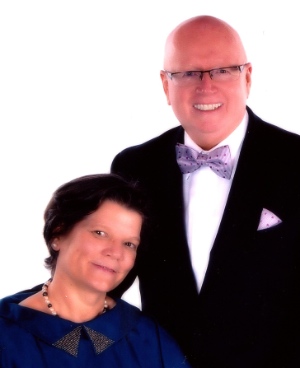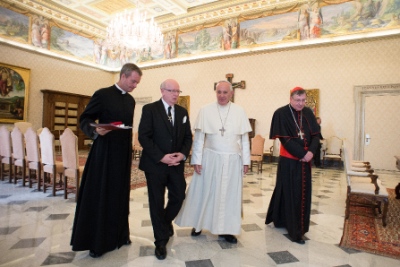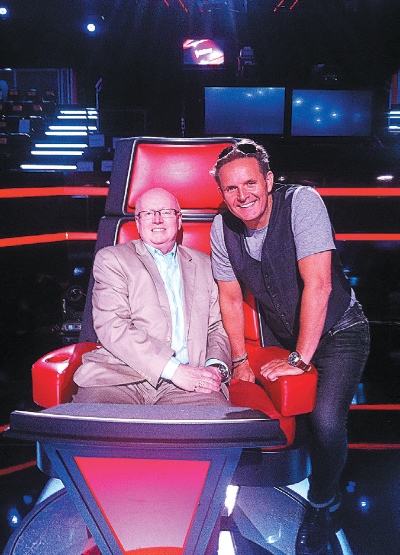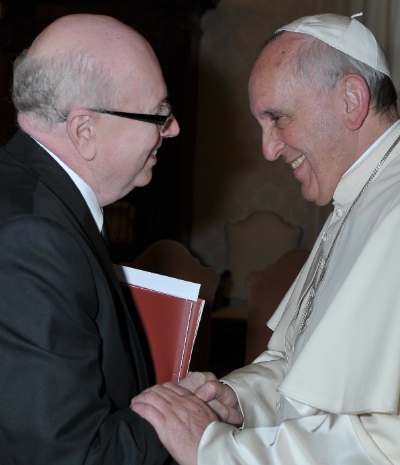
The head of the World Evangelical Alliance and the head of the Roman Catholic Church. Geoff Tunnicliffe and Pope Francis met twice this year.
“We are very happy to be back in Vancouver.” So says Geoff Tunnicliffe as he eyes the end of his term as secretary general of the 600 million member World Evangelical Alliance (WEA) at the end of this month. While he is clearly sincere in his assertion, it is also important to put it in context.
Geoff and his wife Jewel have lived in both New York and Vancouver while he ran the WEA, and he has visited at least 70 nations in the course of his duties since 2005.
Just last month, for example, he met with Pope Francis November 6 at the Vatican, and with the Ecumenical Patriarch of Constantinople, Bartholomew I, in Istanbul Turkey November 25.
So, when he says he’s happy to be back, he still may not be ready to spend quite as many nights at the family home as most of us. Here is some of what Geoff plan to get to do:
The basic question we asked was how do I best steward the remarkable relationships and experiences that have been a part of my journey. With that in mind, we decided instead of serving one particular organization we would work with several companies/ministries. These involve several major media projects, including working with Crossroads Communications, Mark Burnett and Roma Downing, and Christian Media Corporation International. In addition, there are several other film projects that I will be working on.
I’ll also become a member of a global network of former prime ministers/parliamentarians and several companies that are committed to nation-building and working for the common good. And I will be working on a new book that will be geared towards the broader culture and not just the Christian sub-culture.
Geoff and Jewel moved into a new home in White Rock over the summer, and are members of The Way Church in Richmond. He says of the church: “They have been incredibly supportive of our ministry.”
Following is a Faith Today interview with Geoff Tunnicliffe, published earlier this fall. It is re-posted by permission.
Faith Today: As you prepare to step down at the end of December, have you accomplished what you hoped with this immense, diverse global body?
Geoff Tunnicliffe: Ten years ago, when I started, in some ways I knew what needed to happen in terms of the WEA. We needed to step into the space that really only the WEA could step into. There are three Christian world bodies – the Vatican representing Catholics, the World Council of Churches representing mainline Christians, and the WEA representing Evangelicals/Pentecostals. We needed to fill out that space more. Ten years ago, if you told me where we have come to today, it’s far more than I could have imagined. It is by God’s grace, and I don’t say that with a false sense of humility. The opportunities have come before us. There’s no way you could manipulate those doors to open. There was an obedience on our part to say we want to lean into this space and serve the global Christian family, our tribe in the evangelical world, in a way that is meaningful and significant, and in some ways going back to the roots of the WEA.
FT: What are those roots?
GT: Christian unity, religious freedom, theological orthodoxy. And a commitment to the holistic nature of the gospel. WEA came out of the era of the William Wilberforces. It was that kind of evangelicalism that was holistic in nature. Those are the kinds of elements, and then bringing clarity to our voice where there was a sense of strong unity.
Because of the globalization of the church, the move of the spirit in the Majority World, the Global South, however you describe that, we had to answer the question, “How do we as a world body serve the depth and extent of the global church?”
The WEA has a presence and place and a voice in a global context, whether it’s the United Nations or the World Bank or governments, or other religious bodies. We are the responsible voice in the evangelical world.
FT: From our point of view at Faith Today, it would be hard to deny that the WEA is far better known today.
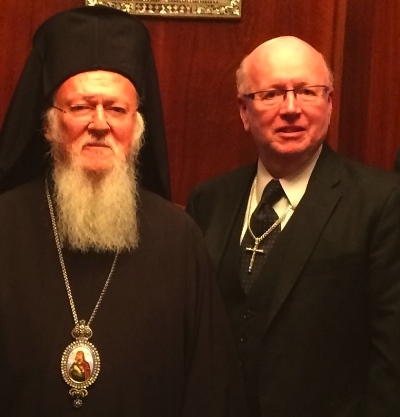
Geoff Tunnicliffe met with the Ecumenical Patriarch of Constantinople, Bartholomew I, in Istanbul Turkey November 25.
GT: For Canadian readers this is really important to understand. When I came into the role, I was working for the Evangelical Fellowship of Canada (EFC) full-time. I thought I had the best job in the world. I was no longer CEO of anything. I was living in Vancouver, consulting with big churches across Canada on behalf of the EFC and their global strategy. What more could you want?
Yet, because of that role with the EFC, I was involved with WEA’s mission commission. When WEA went through somewhat of a crisis and I was asked to become interim secretary general, I turned it down three times. But with the strong support of the EFC – and for me, having the EFC as a strong model of what an evangelical fellowship could look like – that helped frame what we could do.
FT: Did you quickly realize the potential you were sitting with?
GT: Things started picking up. People started being attracted to what we were doing and engaging with it, offering resources. We asked, “How can we serve our family?” My basic skill set is entrepreneurial. You step out in faith and say, “How do you want to do this?” I’m not a sit-behind-the-desk administrator.
One of the key things missing in the WEA was communications. We worked very hard at building those capacities. If you’re going to be a voice, you need to communicate.
FT: We all hear about the wonderful globalization of the church, the rising numbers of Christians in the Global South. What does a Canadian Christian need to know about the church in the Global South?
GT: I went out as a short-term missionary, which resulted in my first career as a missions executive who mobilized people to go out on missions. That was influenced by a view of the world with Canadian churches sending out missionaries to found churches, to work in orphanages and that sort of thing. That was almost 40 years ago.
The world has changed so dramatically in terms of church and how we engage with the church around the world, and who we should be sending, why we should be sending them. I really believe there is a need for Canadian long-term and short-term missionaries to go, but what they do and how they serve, and what those experiences should be is about mutuality and mutual serving. It’s about learning experiences.
FT: Do you see difficulties for Canadians in embracing that?
GT: There are some remarkable moves of God around the world and somehow there’s also a stereotyping that sometimes we Canadians do. It’s the glamorization of missions on one hand, and then us thinking we don’t need to send missionaries, only money. Both extremes are not helpful. We have to continue to find what it means to truly partner and learn from each other.
I’m learning more and more of the ongoing need for reformation. It’s the connecting of Sunday with the rest of the week, the opportunity for engaging in business, in international diplomacy, those in themselves are kingdom work.
The business that I have, how is it helping? How are we working together for the common good in society where I happen to be? Or the areas of interdiplomacy. I served as an advisor to the U.S. State Department on U.S. foreign policy, to President Clinton. When asked to serve on this small body, I said, “You know I’m Canadian, and you know I serve with a global organization?” They said yes. Religion actually plays such a critical part in understanding worldview and we need to understand that. As churches we need to be commissioning people into those kinds of roles. A business leader told me he was waiting for the day when a church says they are commissioning Tim and Sue, who are going to work in business.
FT: How do you see that kind of change coming?
GT: We’ve made a certain segment of people vocational missionaries, but we’re not allowing other people to be released in other ways. One of the waves coming is that there are some incredible business marketplace people who are dreaming big visions for kingdom impact. It’s going to be done through their businesses.
There’s a rising tide of people like that across the world. Then you think about the whole area of peace-building. There are opportunities that move us out of the classic missionary moment. We need to be on the leading edge of peace building around the world. There are some incredible evangelical leaders I have met who are living and working that out in some of the toughest places in the world.
FT: That old perceived divide between the social gospel and evangelism is not so pronounced anymore.
GT: We are about to launch a major new initiative around nuclear weapons, an area where evangelicals haven’t been known to engage. But when the UN comes to you and says, “We need you to lead the moral voice in this,” you do it.
Some in our community think we are on the slippery slope of social gospel. Nothing could be further from the truth. It’s a deep reflection of our faith. I have had the opportunity to share my personal faith with leaders in so many different contexts. You speak with sensitivity. I’ve had more opportunities in places that sometimes the church puts 666 over like the UN, in a relational context, to share what it means to be an evangelical Christian. Because there’s a lot of stereotyping. I was at a dinner with Alex Baldwin. He asked me who I was with. I told him we were working on rehabilitating the word “evangelical.” He said, “Good luck with that!” We are helping people interpret it differently. So often it’s aligned with a political body, particularly coming out of the U.S. I think we’ve helped reshape that.
FT: How have you seen the relationships between different types of Christians change?
GT: Globally there is far more cooperation in some places between the Christian families than you would expect. Many of the historic mainline churches that might have very liberal tendencies, you go into other places and they are as evangelical as your Baptist church down the road.
Our relationship with the Vatican has dramatically changed. The depth of conversations now is far different than they were 10 years ago. It’s not watering down what we believe. It’s about moments like having a cardinal from India ask me how we can evangelize India together. There are some deep theological differences. But there is something new that is happening. We have to figure out how to embrace what God seems to be up to.
FT: You met with Pope Francis earlier this year. How did that come about?
GT: The meeting with Pope Francis came at his request. There will be no official statement. We had a three-hour conversation with no agenda. The intent of the meeting was really about getting to know each other and building a friendship.
FT: How would you describe the state of the friendship then, at this point? And why is it so important to build this friendship?
GT: I am deeply humbled that I have begun a friendship journey with Pope Francis. In the coming months and years our hope is connect regularly to deepen our relationship. We committed to regular pray for one another.
I have discovered building trusted friendships allows for deep, honest and transparent discussions that can be game changers when you face challenges or conflicts. It is my hope such a trust friendship will be a help in overcoming some of the difficulties between Catholics and Evangelicals and that it will help work together more particular for the persecuted Church. [Pope Francis and Geoff Tunnicliffe met again November 6.]
FT: You’ve met some very high-level people. But I assume you’ve also met some amazing ordinary folks you will never forget.
GT: I’ve met a lot of very influential people, like Mark Burnett and Roma Downey. But some of the most moving situations for me have been sitting with Christians who have been imprisoned for their faith or greatly restricted, but are living boldly for Christ. I’ve been in the slums of Manila and Bangladesh, and seen the joy they have in Christ, knowing they have so very little.
I live in a comfortable home in Vancouver. I travel the world. These people who are followers of Christ have so little and yet have this deep sense of God’s presence in their lives. It is deeply humbling. Those are the heroes of the faith. The heroes of the faith are people who every day live it out. Women in the Democratic Republic of the Congo who are at the forefront of peace-building in their little village where the men have been hiding. Those are the people who stand out for me.
But some of the celebrities have a depth of humility that is really quite remarkable. They walk their talk. I’ve seen them work with their crew on their set. They care for people. They seek to live out Christ’s love in that context. It’s about guarding your heart.
FT: What is your hope for the church, knowing what you know now from all you’ve seen?
GT: That if we really want to live out the prayer of John 17, we’ve got to get over a bunch of stuff, like making sure we all cross the same t’s.
Yes, we have core things in common, but there is all that other stuff that divides us. We have to get beyond that.
God’s desire for his church is that we live out and reflect who he is, that we reflect the unity of the trinity. I’ve seen the power of diverse people coming together. I’ve seen the negative impact when we split apart. My prayer will continue to be that we have greater unity. My hope for the future is that the WEA will continue to be a strong voice for Christian unity. Not just for our own tribe, but for the broader Christian community as well.
FT: Thank you, Geoff.
All photos were supplied by Geoff Tunnicliffe.

